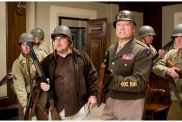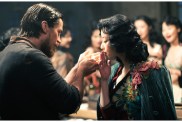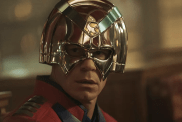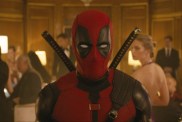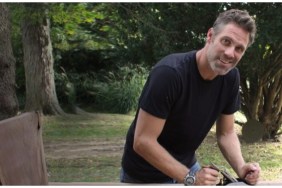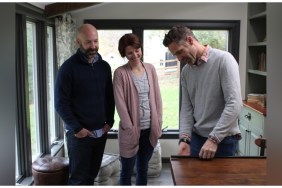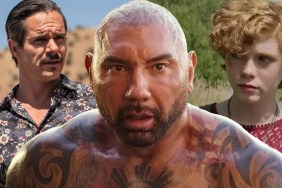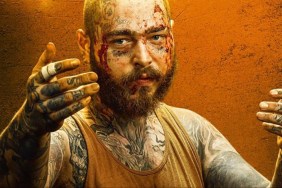Anton Yelchin as Tommy Warshaw
Téa Leoni as Mrs. Warshaw
David Duchovny as Tom Warshaw
Robin Williams as Pappass
Eryka Badu as Lady/Bernadette
Magali Amadei as Coralie Warshaw
Harold Cartier as Odell Warshaw
Mark Margolis as Mr. Pappass
Zelda Williams as Melissa
Summary:
The good moments in David Duchovny’s directorial debut are so bogged down in problems that it’s hard to enjoy what could have been a touching coming-of-age story.
Story:
In the Greenwich Village of the ’70s, 12-year-old Tommy Warshaw (Anton Felchin) lives with his grief-stricken widow mother (Téa Leoni); his best friend is a middle-aged retarded man named Pappass (Robin Williams); and he gets advice on love from an unseen woman at the local women’s detention center (Erykah Badu). These relationships are deeply affected when things start falling apart around him as he reaches his 13th birthday.
Analysis:
Every director at one point in their career has to deal with the difficulties of making a first film. This hurdle may not have been so hard for actor David Duchovny. He’s married to Téa Leoni, a talented actress who might have been easier to convince to star in the movie at a lower rate. It also may have been easier to get an actor like Robin Williams to play a part or to convince New York officials to allow you to shoot on the streets without paying exorbitant fees. With that in mind, there’s plenty of reasons to believe that Duchovny would use these advantages in his favor for his debut as a filmmaker, both writing and directing House of D, and that the results would be stronger.
The movie begins in Paris where Tom Warshaw, played by Duchovny himself, is married with a son who is just turning thirteen. This monumental birthday spurs Tom to tell his wife and son a true story from his youth in New York, and how he ended up running away to France. Flashback to the Greenwich Village of the 70’s where the younger Tommy attends Catholic school during the day and delivers meat for a butcher with his mentally retarded friend Pappas after school. They spend a lot of this time clowning around and talking about girls, but a lot of this is to escape the grief of his losing his father at a young age, something that his mother has never quite gotten over. The “D” in the title is not some form of self-reverence, but rather, it refers to an actual women’s house of detention that resided in Greenwich Village in those days, where Tommy finds someone to talk to in the jailed Bernadette.
House of D suffers from many of the same problems as Kevin Spacey’s Beyond the Sea, because it’s hard not to immediately think of it as a vanity piece because of Duchovny’s role and the similarities to his own upbringing in downtown New York. Then again, this background helped Duchovny recapture the feel of downtown New York during the era, as does the soundtrack that includes well-picked tracks from the Doobie and Allman Brothers.
On the other hand, the pacing and tone of the movie is all over the place, so it never allows you to fully feel the characters’ emotions with them. Because of this, Duchovny’s ideas are watered down into a rather soppy drama that never quite rings true, because the dialogue tries too hard to be clever or meaningful.
You have to give young Anton Yelchin some credit for carrying the majority of the film, but he’s not a very good actor. It’s impossible to believe that he’s only thirteen, because he looks older and is taller than many of his co-stars. His smarmy and sarcastic delivery, a bit like Kieran Culkin in Igby Goes Down, also gives him away as an older and more modern-day teenager. Yelchin isn’t nearly as good handling the dramatic parts as the humor, especially evident later in the story where he is upset to the point of tears. Yelchin gives such an over-the-top performance that you wonder how it didn’t end up on the cutting room floor in favor of a better take.
On the other hand, it’s hard not to enjoy the banter between Yelchin and Robin Williams’ Pappass, as they work well together on the screen. Williams is not nearly as annoying as a retarded man as you might expect, and he offers some of the movie’s funnier and more poignant scenes. Although it would be too easy to chide Duchovny for hiring his wife, Tea Leoni is great as Tommy’s mother, giving another terrific well-rounded emotional performance that shows her to be at the top of her game. While the scenes between her and Yelchin work on an emotional level, the same can’t be said for the “house of d” scenes where Yelchin and Badu yell at each other back and forth from the street to her cell window. It’s a concept that gets tiring very fast, as the relationship seems so false and contrived.
Duchovny ends up being his own movie’s weak link, since his character, the older Tom, seems almost superfluous to the story. Maybe the movie would have worked better if the movie cut back to the older Tom more frequently, rather than him just being heard through an ever-present narrative. Hearing Duchovny’s voice over the movie tends to take you out of the story, and by the time you get back to the present day, you’ve forgotten that you’re watching a flashback. The epilogue showing the older Tom returning to New York to try to get closure as he revisits his old haunts and friends, also seems to go on forever.
The Bottom Line:
House of D is by no means terrible. The cast is decent and some may enjoy the story Duchovny wanted to tell. Sadly, the execution leaves a lot to be desired because the parts don’t ever really come together into a coherent story, much of which could be owed to Duchovny’s inexperience as a storyteller.

